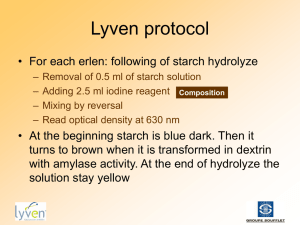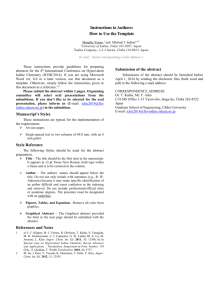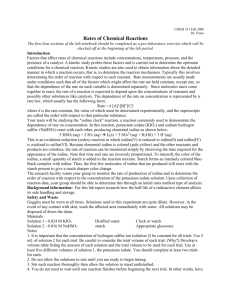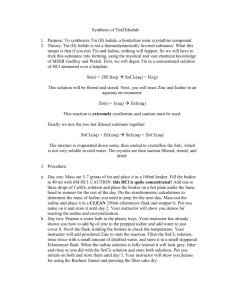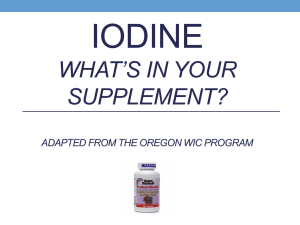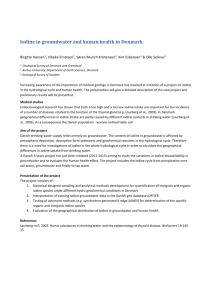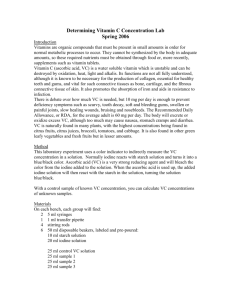The Iodine Supplementation Protocol Not Just For Breast Cancer
advertisement
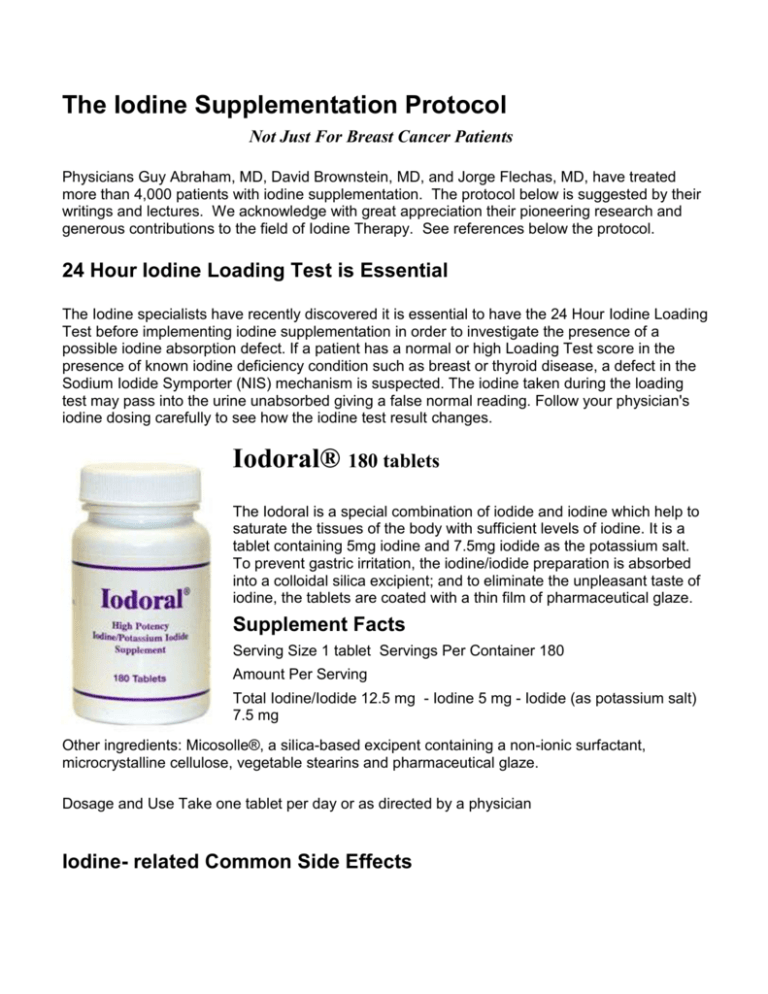
The Iodine Supplementation Protocol Not Just For Breast Cancer Patients Physicians Guy Abraham, MD, David Brownstein, MD, and Jorge Flechas, MD, have treated more than 4,000 patients with iodine supplementation. The protocol below is suggested by their writings and lectures. We acknowledge with great appreciation their pioneering research and generous contributions to the field of Iodine Therapy. See references below the protocol. 24 Hour Iodine Loading Test is Essential The Iodine specialists have recently discovered it is essential to have the 24 Hour Iodine Loading Test before implementing iodine supplementation in order to investigate the presence of a possible iodine absorption defect. If a patient has a normal or high Loading Test score in the presence of known iodine deficiency condition such as breast or thyroid disease, a defect in the Sodium Iodide Symporter (NIS) mechanism is suspected. The iodine taken during the loading test may pass into the urine unabsorbed giving a false normal reading. Follow your physician's iodine dosing carefully to see how the iodine test result changes. Iodoral® 180 tablets The Iodoral is a special combination of iodide and iodine which help to saturate the tissues of the body with sufficient levels of iodine. It is a tablet containing 5mg iodine and 7.5mg iodide as the potassium salt. To prevent gastric irritation, the iodine/iodide preparation is absorbed into a colloidal silica excipient; and to eliminate the unpleasant taste of iodine, the tablets are coated with a thin film of pharmaceutical glaze. Supplement Facts Serving Size 1 tablet Servings Per Container 180 Amount Per Serving Total Iodine/Iodide 12.5 mg - Iodine 5 mg - Iodide (as potassium salt) 7.5 mg Other ingredients: Micosolle®, a silica-based excipent containing a non-ionic surfactant, microcrystalline cellulose, vegetable stearins and pharmaceutical glaze. Dosage and Use Take one tablet per day or as directed by a physician Iodine- related Common Side Effects Be aware of iodine-related bromide detox symptoms. Symptoms of "bromism" may occur in some people. See below for a list of recorded bromide symptoms. Patients are usually advised to cut back on iodine and salt load more frequently. Bromide symptoms include but may not be limited to: eye lid twitching foot twitching tingling in hands or feet dark thoughts (e.g., there is no reason to live) depression (e.g., there is no reason to get out of bed) anxiety emotionality mouth and tongue sores and cuts or "sore mouth" "different" acne,"bromide acne," "acne-like eruptions" without "coniform." (Some iodine users found zinc helps bromide acne.) skin "cuts" hair loss brain fog leg and hip ache (feels like arthritis) rash (bromaderma) metallic taste sinus ache runny nose headache sedation lethargy body odor (bromos is Greek for stench) unusual urine odor dry mouth ureteral spasm, frequent urination (mistaken for urinary infection) diarrhea constipation vision changes irritability increased salivation dream changes hormone changes kidney pain The doctors find that the most common side effects are usually resolved with 3 grams of vitamin C and/or the salt loading protocol. Salt Loading Protocol Used to Detox Bromide Symptoms William Shevin, MD, uses a specific protocol to clear bromide detox symptoms if they occur while taking iodine. Dr Shevin presented his* Salt Loading Protocol at the February '07 Iodine conference: 1/4 teaspoon* salt dissolved in 1/2 cup warm water, then followed immediately with 12-16 oz pure water. Repeat in 30-45 minutes if needed. May repeat again until copious urination begins. Observe subjective response (usually within several hours). *Celtic sea salt is preferred. Be sure to ask your doctor before implementing this or any medical strategy. NOTE: Iodine Investigation Project participants found 1/2 teaspoon salt dissolved in water works faster than the 1/4 teaspoon dosage Important: The following protocol should be implemented only under your doctor's supervision and monitored with the appropriate laboratory work and thyroid studies. Report any side effects to your physician. Do not take iodine if you are allergic to iodized salt. Iodine Supplementation Protocol with Companion Nutrients Update: from October 2007 Iodine Conference 50 mg Iodoral minimum for breast cancer (others may start with 12.5 mg). Some practitioners may recommend another form of iodine such as Lugol's solution. Iodoral is the Lugol's formula in tablet form especially designed to avoid gastric irritation. Vitamin C - 3,000 mg per day (more may be necessary to detox bromide). 300 mg magnesium oxide or comparable magnesium supplement. 200 mcg selenium. 500 mg niacin (B3) twice a day. (NOT niacinamide) Start lower to avoid flush. 100 mg Vitamin B2 three times a day. A comprehensive vitamin and nutrition program. (Feb 2008) Dr. Guy Abraham cautions that "excess calcium supplementation (2,000-3,000 md/day) has been the most common cause of poor response to iodine supplementation." Vitamin Research News Vol. 22. Number 2. Salt Loading Protocol for Possible Bromide Side Effects Orthoiodosupplementation induced and increased mobilization of bromine from storage sites, with increased urinary excretion of bromide. --Guy Abraham, MD Certain iodine-literate doctors feel the bromide excreted by iodine therapy can be eliminated more efficiently by the chloride present in mineral-rich Celtic salt. The salt is added to water in a specific way. Eating salty food is not effective. Table salt is only used in an emergency. Some members of the Amazon discussion group have found the Salt Loading Protocol devised by Dr. William Shevin (and presented at the February '07 Iodine Conference) to be effective in eliminating the side effects such as bromide sedation, acne, brain fog, brassy taste, mouth sores, frontal headache or other symptoms which occur in a small percentage of patients. 1/4 teaspoon* salt dissolved in 1/2 cup warm water. Follow immediately with 12-16 oz pure water. Repeat in 30-45 minutes if needed. May repeat again until copious urination begins. Observe subjective response (usually within several hours). *Iodine Investigation Project participants have found 1/2 teaspoon salt dissolved in the recommended amount of water works faster than the 1/4 teaspoon dosage. *Pulse dosing of iodine has often helped our participants with detox symptoms: taking a two day break from iodine supplementation as needed seems to enhance the kidneys' ability to excrete bromide. These our only our observations as educated patients. Consult your own physician about your particular iodine regimen. No consensus exists on how important the salt loading may be to an iodine therapy strategy if the patient does not have adverse symptoms. References: 1. Brownstein, Why You Need It, Why You Can't Live Without It, (Second Edition) Medical Alternative Press, West Bloomfield, MI 2006. See drbrownstein.com. 2. Abraham, GE, The Historical Background of the Iodine Project, The Original Internist 2005 3. Abraham, GE, Iodine Supplementation Markedly Increases Urinary Excretion of Fluoride and Bromide, Townsend Letter 2003 4. Abraham, G.E., Brownstein, D., Evidence that the administration of Vitamin C improves a defective cellular transport mechanism for iodine: A case report. The Original Internist, 12(3):125130, 2005 [excerpt] Elevated bromide levels were observed in urine and serum samples, twenty times the levels reported in the literature in normal subjects(8,9). Mild bromism may have been the cause of the oxidative damage to the iodine transport system and the side effects to orthoiodosupplementation. Chloride competes with bromide at the renal level and increases the renal clearance of bromide (10,11). Sodium chloride at 10 gm/day for one week resulted in marked increase in urine bromide levels, and a sharp drop in serum bromide. While on the chloride load, urinary frequency improves for the first time in 5 years, but fatigue worsened and she experienced facial and body acne. No significant change in symptomatology was observed while on Vitamin C. The responses of her symptoms to various treatments modalities by self-assessment are summarized in Table I. The treatment modalities are cumulative and added sequentially in the patient's management. Measurements of serum and urine bromide and iodide levels reported in this manuscript were performed by ion-selective electrode assay, following chromatography on strong anion exchanger cartridges, as previously described (3,7).
